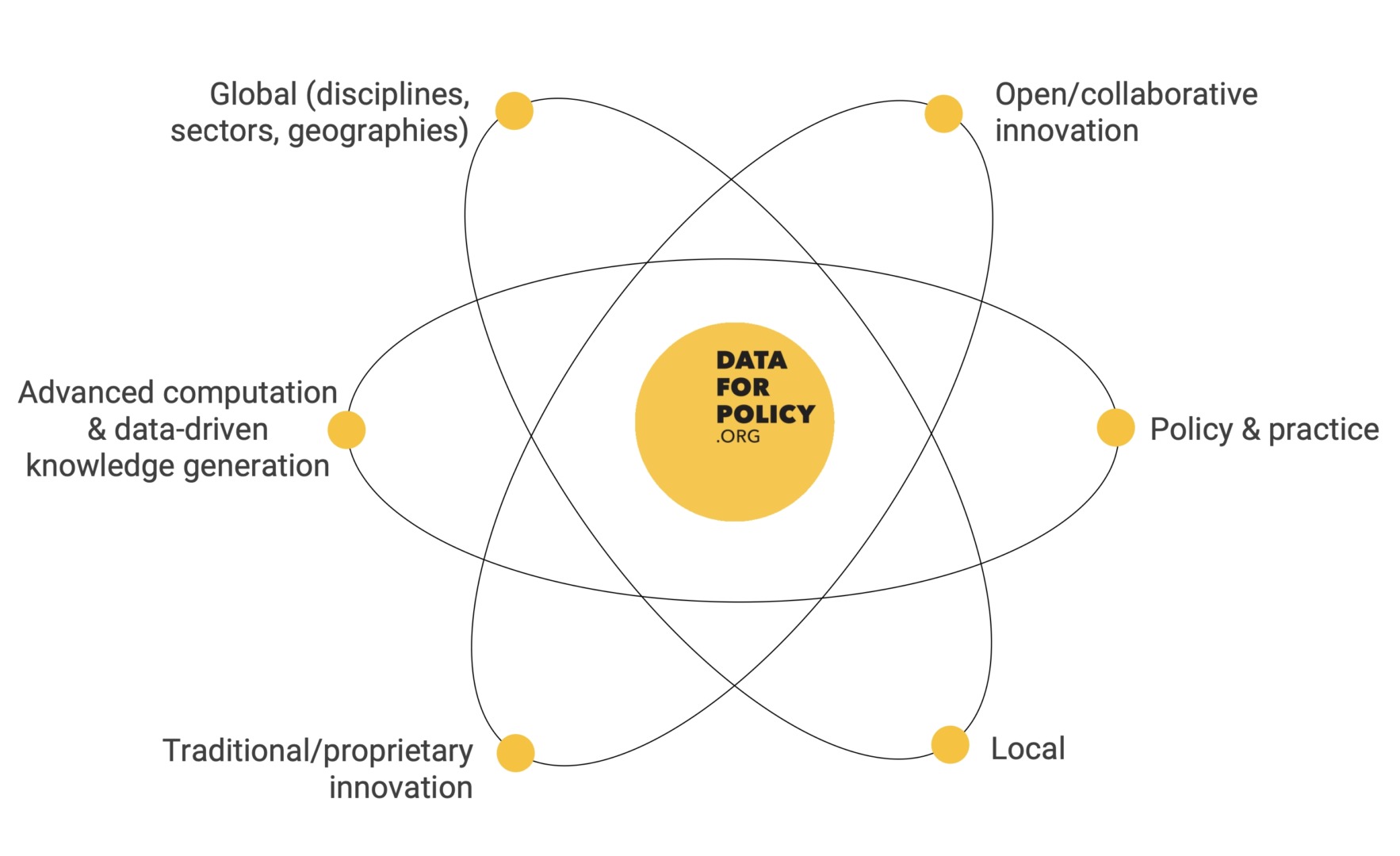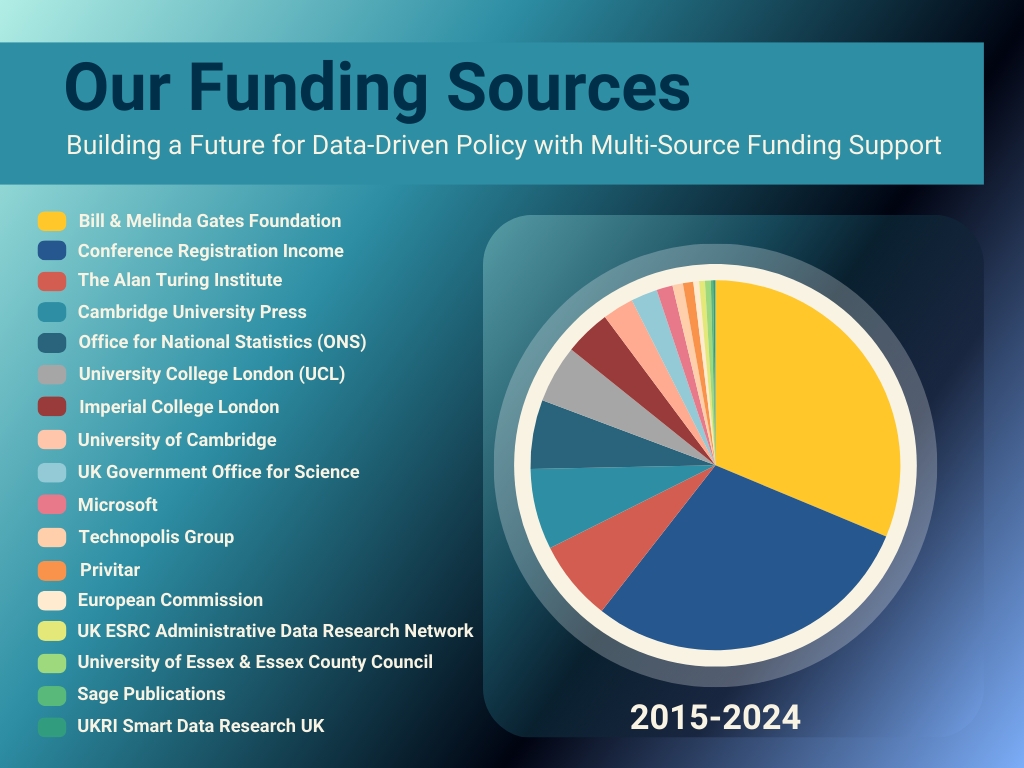About Us
Who We Are
Data for Policy is a leading global community dedicated to fostering a beneficial discourse on the impact and potential of data, AI, and related technologies in government, governance, and policy. Established in 2014 by Dr. Zeynep Engin and Professor Jon Crowcroft, the initiative originated from a series of academic, policy, and industry conversations facilitated by University of Cambridge’s Centre for Science and Policy (CSaP). This collaborative effort garnered rapid support from key UK and international institutions, as illustrated in the community timeline (see figure below). Today, Data for Policy flourishes with a network of over 5000 experts globally, actively shaping and enriching this transdisciplinary and cross-sector dialogue.
In 2018, Data for Policy solidified its status as a non-profit Community Interest Company (CIC) registered in the UK.
Our inaugural report provides more background on our journey from 2014 to 2023.

Timeline of Data for Policy community development 2014 - 2023
Data for Policy CIC Board of Directors
The Board of Directors is responsible for the management and oversight of the CIC’s business, to ensure that the stated aims and statutory obligations of the CIC are fulfilled. The directors make decisions on the strategic direction of the CIC, and on matters such as development proposals or operational changes. Day-to-day running of the CIC is delegated to the executive team.
Dr Zeynep Engin (Data for Policy CIC)
Professor Jon Crowcroft (University of Cambridge & The Alan Turing Institute)
Professor David Hand (Imperial College)
Dr Emily Gardner (Data for Policy CIC)
Professor Stefaan Verhulst (GovLab, New York University)
Former Members
Professor Anil Bharath (Imperial College)
Professor Sir Anthony Finkelstein (City, University of London)
Professor Philip Treleaven (UCL)
Vision and Mission
The Data for Policy community is committed to producing actionable insights that enhance the critical decision-making process, embracing a forward-thinking approach to data-driven technologies and methodologies.
Our goal is to shape a more informed, equitable, and sustainable future for all by harnessing the transformative potential of data, AI, and associated technologies. We include the values, principles and processes guiding this journey, recognising that “how” is an integral part of the ultimate goals. Our approach to shaping the data for policy discourse revolves around three main axes, as indicated in the diagram below.

Realizing our vision and values
Data for Policy Conference Series
The inaugural Data for Policy conference in 2015, hosted by the Computer Laboratory at University of Cambridge, was catalysed by shared recognition: despite abundant data and significant advancements in methodologies and technologies, decision-making processes often fall short of fully leveraging these resources in the public interest or effectively addressing stakeholder needs.
Since then, each successive edition of the conference has drawn substantial interest, attracting a wealth of high-quality submissions from top researchers and thought leaders in the data for policy space. Following six successful global conferences in the UK, the Data for Policy series expanded to include regional editions in 2022, with three conferences held in Hong Kong, Seattle, and Brussels. This strategic move allows the community to alternate between global and regional conference models, ensuring a balance between fostering global conversations and networking opportunities, while also capturing the diverse contexts of data for policy research worldwide.
Data & Policy Journal
In 2016, Data for Policy embarked on a strategic collaboration with Cambridge University Press to create a dedicated platform for scholarly and cross-sector publications. This collaboration culminated in the 2019 launch of the open-access Data & Policy Journal, coinciding with the fourth Data for Policy conference held at UCL. The journal reflects the community’s commitment to fostering innovation to capture changing dynamics in knowledge exchange and dissemination. Since its inception, Data for Policy has championed novel editorial processes and publication formats to share cutting-edge research in the field of data for policy. The community continues to provide ongoing editorial oversight and management support for the journal. A novel integrated peer-review process launched in 2022 seamlessly bridges Data for Policy conference dialogues with publication opportunities in the Data & Policy journal.
Data for Policy Equity Initiative
As the Data for Policy community continues to grow, it becomes increasingly evident that proactive support for underrepresented communities is essential in shaping inclusive conversations. Data, AI, and associated technologies, especially within government, governance, and policy contexts, offer both historic opportunities and unprecedented challenges. Navigating these requires a balanced dialogue that considers not only the perspectives of those who traditionally engage in such conversations.
In 2022, we embarked on a new chapter with strong support from the Bill & Melinda Gates Foundation to launch our proactive inclusion program. Initially, our focus has been on fostering participation from Sub-Saharan Africa in the data for policy discourse. Through a series of strategic consultations held in Africa with regional stakeholders, and by providing financial support to individual researchers and experts via our ‘inclusion scholarship’ program, we have seen a remarkable rise in regional contributions to our community efforts.
We are committed to sustaining and expanding this program through continued fundraising. Our aim is to extend equitable opportunities to other underrepresented regions, ensuring a more inclusive space for data for policy dialogue across the globe.
Data for Policy Funding Sources
Data for Policy CIC operates as an independent community interest company, supported by contributions from philanthropic organisations, academic institutions, corporate partners, and registration fees from Data for Policy Conferences. These funding sources play a crucial role in helping us drive innovation and knowledge exchange in data-driven policymaking.
Our funding is structured into the following categories:
General Operating Funds
These unrestricted funds support the full scope of our organisational activities. While our flagship Data for Policy conferences aim to be self-sustaining, registration income helps cover both the event’s organisational costs and additional operational expenses for Data for Policy CIC’s ongoing initiatives. However, this income is not always sufficient, so we rely on support from partners to fully fund our conferences and related activities.
Project-Specific Funds
These targeted funds are designated for specific projects within Data for Policy CIC. Funders have the opportunity to collaborate on focused initiatives, such as policy programme development, themed panel sessions, or other strategic projects, with clear objectives and measurable outcomes. This model allows funders to directly contribute to areas aligned with their goals while enhancing the broader impact of data-informed policymaking.

Further Information
Further information can be obtained from the Community Administrator: team@dataforpolicy.org

